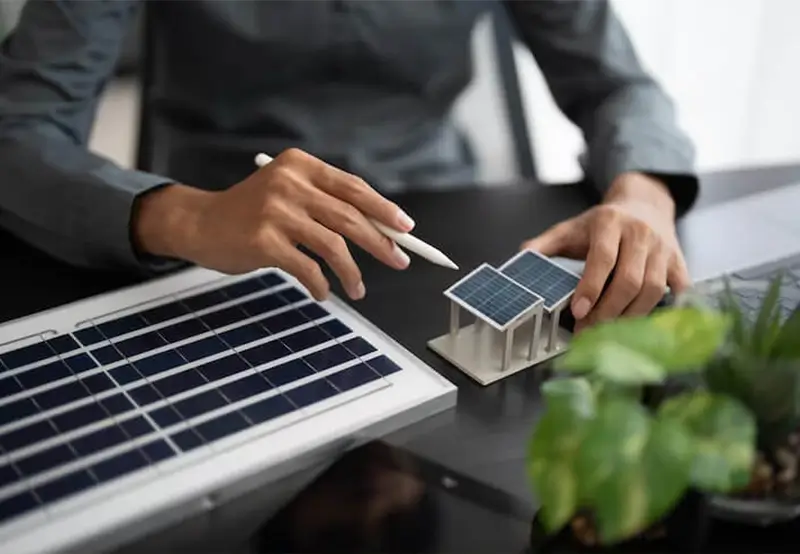How To Choose The Right Solar Panel System For Your Residence | Home Solar Guide

Introduction
In today’s world, the shift towards sustainable energy is undeniable. More homeowners are now turning to solar energy, not just for environmental reasons but also for long-term cost savings. Choosing the right solar panels for your home is crucial because it impacts your energy efficiency, financial investment, and property value. With so many options available, making an informed decision ensures you get the maximum benefit from your solar energy system for home. This Home Solar Guide will walk you through everything you need to know about how to select solar panels and build the best solar system for residence.
Why Solar Panels Are A Smart Investment
Investing in solar panels for your home is not just about adopting eco-friendly practices—it’s a financially wise decision. A solar energy system for home can dramatically lower your monthly utility bills, provide protection against rising energy costs, and even add to your home’s resale value. Moreover, installing a solar system for residence often comes with tax credits and rebates, making the initial investment more affordable. Long-term, the best solar systems can offer returns that outpace traditional savings plans, making them a smart addition to any household.
Factors to Consider Before Choosing a Solar Panel System
Choosing the right solar energy system for home requires careful evaluation of several important factors:
Your Home’s Energy Needs
Start by assessing how much energy your household consumes monthly. Review your utility bills to determine your average electricity usage. This information will help you size the solar panels for your home appropriately, ensuring you meet your daily energy demands without overspending on excess capacity.
Roof Size, Direction, and Material
The size, slope, and material of your roof play a huge role in the efficiency of a solar system for residence. South-facing roofs receive maximum sunlight in the northern hemisphere, while east and west-facing roofs can still be effective with the best solar systems. Ensure that your roof is in good condition and can support the additional weight of solar panels for your home.
Local Climate and Sun Exposure
Solar energy performance varies by region. If you live in an area with frequent sunny days, you’ll get the most out of your solar energy system for home. However, even in cloudy regions, modern solar panels for your home can still generate a substantial amount of electricity.
Budget and Financing Options
Installing a solar system for residence is a significant financial investment. Fortunately, many options exist such as loans, leases, and Power Purchase Agreements (PPAs) to make the best solar systems accessible to more homeowners. Carefully consider your budget and explore financing options before committing.
Incentives, Rebates, and Tax Credits
One major advantage of installing solar panels for your home is the availability of federal, state, and local incentives. Programs like the Federal Solar Investment Tax Credit (ITC) allow homeowners to deduct a significant percentage of installation costs. Researching available incentives can substantially reduce the upfront cost of your solar energy system for home.
Warranty and Maintenance Support
Choosing the best solar systems means looking beyond just the hardware. Strong warranties (typically 20–25 years) on performance, equipment, and workmanship can protect your investment. Also, select providers who offer maintenance support to ensure your solar system for residence operates efficiently for decades.
Types of Solar Panels Explained
When learning how to select solar panels, it’s important to understand the three main types available:
Monocrystalline Panels
- Pros: High efficiency, sleek appearance, and excellent performance in low-light conditions.
- Cons: Higher cost compared to other types.
Monocrystalline solar panels for your home are ideal for those seeking the best solar systems with maximum efficiency and longevity.
Polycrystalline Panels
- Pros: Lower cost and easier to produce.
- Cons: Slightly lower efficiency and more space required.
Polycrystalline panels are a great choice if you’re looking for a more budget-friendly solar energy system for home without sacrificing too much on performance.
Thin-Film Panels
- Pros: Lightweight, flexible, and low-cost.
- Cons: Lower efficiency and shorter lifespan.
Thin-film panels suit specific applications where traditional panels aren’t viable, though they may not always be the best solar systems for every homeowner.
Choosing The Right Solar Company
Selecting the right installer is just as important as choosing the panels themselves. Here’s how to vet your options:
- Experience: Look for a company with a strong track record of installing solar energy systems for homes.
- Certifications: Ensure the installer is certified by recognized organizations such as NABCEP.
- Reviews and Testimonials: Customer feedback can provide insights into reliability and service quality.
- Transparent Pricing: A reputable company should offer detailed quotes and clear information about the best solar systems they recommend.
- Warranties: Confirm that both product and installation warranties are covered.
Mistakes To Avoid When Buying Solar Panels
While understanding how to select solar panels, watch out for these common mistakes:
- Choosing Based on Price Alone: The cheapest option isn’t always the most efficient or durable.
- Ignoring Roof Condition: Failing to inspect and repair your roof beforehand can lead to future issues.
- Not Considering Future Needs: Your energy consumption may grow. Planning for future expansion ensures your solar energy system for home remains sufficient.
- Skipping Installer Research: Not all companies offer the best solar systems or professional service.
- Neglecting Incentives: Missing out on rebates and tax credits can cost you thousands of dollars.
Conclusion
Choosing the right solar system for residence involves evaluating your energy needs, roof characteristics, budget, and the types of panels available. It’s not just about installing any solar panels for your home—it’s about selecting the best solar systems that meet your specific requirements while offering durability, efficiency, and affordability. Knowing how to select solar panels empowers you to make an informed decision that can benefit your household for decades. For the best results, always consult a professional solar company that can provide a customized solar energy system for home tailored to your needs. Your journey to a more sustainable future begins with the right choices today!
Frequently Asked Questions (FAQs)
1. How long do solar panels for your home typically last?
Solar panels for your home are designed to last 25 to 30 years or more. Most manufacturers offer a performance warranty that guarantees at least 80% energy production even after 25 years. A properly installed solar energy system for home can continue producing electricity well beyond its warranty period with minimal maintenance.
2. What kind of maintenance does a solar energy system for home require?
The best solar systems are designed to be low-maintenance. Typically, you only need to keep the panels clean and ensure they are free from debris like leaves or snow. It’s recommended to have your solar system for residence inspected once every year or two by professionals to check for any wiring or performance issues.
3. Will my solar system for residence work on cloudy or rainy days?
Yes, your solar energy system for home will still generate electricity on cloudy or rainy days, although the production may be lower compared to sunny days. The best solar systems are designed to capture diffuse sunlight and can perform efficiently even under less-than-ideal weather conditions.
4. How do I determine how to select solar panels for my home?
When considering how to select solar panels, focus on factors like panel efficiency, warranty terms, durability, brand reputation, and your budget. Also, assess your roof size, local climate, and energy needs to ensure you choose the right solar panels for your home.
5. How do I find the best solar systems and installers?
Research is key. Look for certified solar installers with strong customer reviews, competitive pricing, and robust warranty offerings. Choosing experienced providers ensures that you install only the best solar systems customized for your home’s specific needs.











